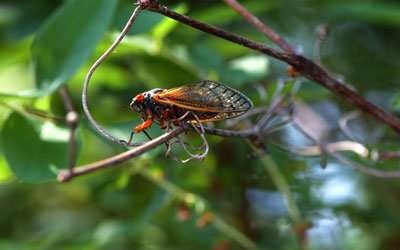 Many people are accustomed to the occasional humming of a cicada during the summertime, but not the loud buzz of thousands! After living underground for 17 long years, cicadas are expected to emerge on the East Coast, including right here in Virginia. Periodical cicadas, often misidentified as “locusts”, live underground for years as juveniles before they emerge above ground for just a few weeks to a month. There are seven periodical cicada species — all members of the population develop at the same time and thus emerge all at once. This makes them much different than your typical cicada species, which are seen every summer. Brood IX is expected to emerge this year in southwestern Virginia as well as southern West Virginia. Keep reading to learn all you need to know about these unique 17-year cicadas.
Many people are accustomed to the occasional humming of a cicada during the summertime, but not the loud buzz of thousands! After living underground for 17 long years, cicadas are expected to emerge on the East Coast, including right here in Virginia. Periodical cicadas, often misidentified as “locusts”, live underground for years as juveniles before they emerge above ground for just a few weeks to a month. There are seven periodical cicada species — all members of the population develop at the same time and thus emerge all at once. This makes them much different than your typical cicada species, which are seen every summer. Brood IX is expected to emerge this year in southwestern Virginia as well as southern West Virginia. Keep reading to learn all you need to know about these unique 17-year cicadas.
What Are Periodical Cicadas?
Periodical cicadas are cicadas that appear at 13- or 17-year intervals. This makes them much rarer than your typical cicada species, which are active annually. 17-year cicadas are grouped into geographical broods based on which calendar year they will emerge. Here’s how to identify periodical cicadas:
- They have black bodies, red eyes, and orange veins on their translucent wings.
- They range in size from 3/4″ to 2 1/2″
- These cicadas have a pair of antennae and six legs
- Periodical cicadas appear in the hundreds or thousands per acre
- They are not to be confused with annual cicadas, which are black and green in color
Why Are They Emerging Now?
17-year cicadas live beneath forest floors for years and receive sustenance from the tree roots. These nymphs live no more than 2 feet away from the surface but can travel deeper to feed. These nymphs will emerge on a spring evening when the soil temperature is more than 64 degrees Fahrenheit. This typically occurs anytime between April and June. The adult cicadas that emerge only live for a few weeks and are typically gone by mid-July.
In their short time, they are focused on reproducing. The male periodical cicadas will “sing”, which is the loud hum you may be used to hearing. After mating, the female will lay up to 600 eggs inside twig slits. When nymphs hatch, they will burrow underground and begin another 13 or 17-year cycle.
Are 17-Year Cicadas Dangerous?
These cicadas pose the biggest threat to young trees, which are the targets for laying eggs. They do not bite or sting humans and do not pose any health threats. They are mostly known to be nuisance pests, in large part due to the fact that they make so much noise! They are by far the loudest insect in the nation, and their “singing” can be heard for up to 1/2 mile away. They may get into your home by accident, but are not able to breed indoors and will not infest your property.
Regardless, if you have troubles with any insects inside your property, it’s always best to call your local pest control company, such as Loyal Termite & Pest Control!
The Emergence of 17-Year Cicadas in Virginia in Virginia
Serving the Henrico and Richmond VA area since 1960
